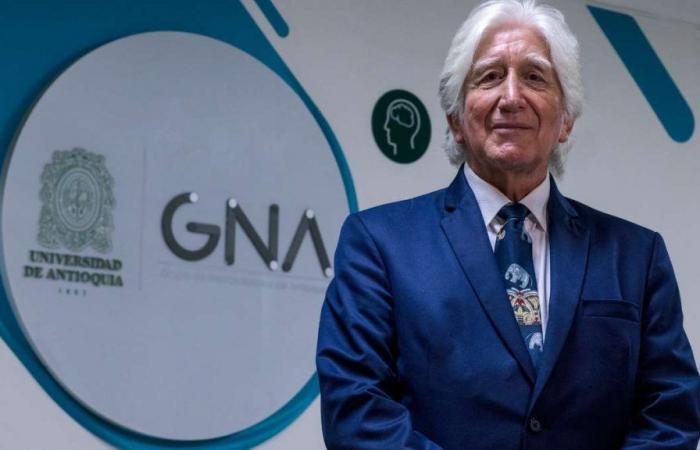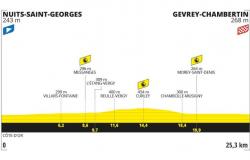Francisco Lopera is the coordinator of the Antioquia Neurosciences Group.
Photo: Courtesy UdeA
In a study published this June 19 in the prestigious magazine The New England Journal of Medicinea team of researchers, including several Colombian scientists, describes the existence of a genetic variant (APOE3Ch, called Christchurch) that causes people with Alzheimer’s to have a late onset of cognitive decline.
The article is headed by Colombian doctor Yakeel T. Quiroz, director of the Familial Dementia Neuroimaging Laboratory and the Multicultural Program for the Prevention of Alzheimer’s, both at Massachusetts General Hospital, and a researcher affiliated with the Neurology Group of Antioquia, where she is Francisco Lopera, who has been researching Alzheimer’s for decades, and who also appears as the author of the research.
Scientists observed that a person with a hereditary form of Alzheimer’s (caused by a specific version of the gene PSEN1) experienced slower mental decline if they also had a particular version of the APOE gene (the aforementioned APOE3 Ch).
To understand this, you must first know that the vast majority of people with Alzheimer’s disease have the sporadic form of the disease, that is, the one that generally appears after the age of 65 and whose cause, although still unknown, It is linked to a series of environmental and lifestyle risk factors.
There is another percentage of people with Alzheimer’s, around 5%, who have the disease due to specific genetic mutations that are inherited in families. These cases, known as Familial or autosomal dominant Alzheimer’sthey usually appear at a younger age.
In Colombia, Lopera and his team have focused precisely on a community in Antioquia where the hereditary form of Alzheimer’s is common. This is the already known “paisa mutation”, which Lopera discovered and has been studying for decades; a work that recently earned him the Potamkin Prize for Research in Pick’s, Alzheimer’s and Related Diseases 2024, the so-called “Nobel of research on Alzheimer’s”. It was awarded by the American Academy of Neurology and the American Brain Foundation.
What does the new research consist of?
In research published in the The New England Journal of Medicine, the team, of which Lopera is a part and is headed by Colombian doctor Yakeel T. Quiroz, from the Department of Psychiatry and Neurology at the Harvard Medical School and Massachusetts General Hospital (MGH), in the United States, analyzed data from 27 people from that Antioch community. These 27 people have the paisa mutation gene, that is, they are destined to suffer from early-onset Alzheimer’sbut at the same time, they also have the genetic copy called Christchurch (APOE3Ch).
Scientists discovered that those people who have both genetic versions (the paisa mutation and the Christchurch) begin to have mental problems at an older age compared to those who only have the paisa mutation. On average, you can read in the study, these 27 family members showed signs of cognitive decline at age 52, compared to a matched group of members who did not have the variant, who began to show symptoms at age 47.
Is this a cure for Alzheimer’s? No, but it does open doors to better understand this disease. One of the signs that indicated that there could be a genetic variant capable of providing moderate protection against the disease was known thanks to Aliria Rosa Piedrahita, a woman from Antioquia who had the paisa mutation and also the Christchurch variant. She should have started showing symptoms of Alzheimer’s disease around age 40 or 50, but she only reported them at the age of 72. She died at 77 from melanoma. As researchers suspected then, and confirm now, the Christchurch variant is responsible for symptoms appearing so late, long enough for people to live most of their lives normally.
“These findings suggest the potential to delay cognitive deterioration and dementia in older people,” Dr. Quiroz explained to the University of Antioquia portal.
“I am delighted with our findings because they highlight the complex relationship between the APOE gene and a deterministic mutation for Alzheimer’s disease, which could pave the way for innovative treatment approaches for the disease, including interventions,” she added. (Can see: They find a new dinosaur)
Although the finding does not represent an immediate cure, it does allow new lines of research based on the APOE3Ch variant, even for the type of Alzheimer’s that is not genetic, that is, the sporadic, which is the one that affects the vast majority of people.
“This study is significant because it increases our confidence that the APOE3Ch variant is not only protective, but also pharmacological. “We believe that therapies inspired by protected humans are much more likely to work and be safer,” said, for example, Dr. Joseph F. Arboleda Velásquez, co-lead author of the article published in The New England Journal of Medicineand scientist associated with Mass Eye and Ear and Mass General Brigham, in the United States.
The study, however, was limited to a relatively small number of people carrying the Paisa and Christchurch variants (27 people), so it is still important that other research be done to learn more about the protective effect of the Paisa variant. Christchurch.
“Our goal is to find preventive treatments against Alzheimer’s and this will be possible thanks to the discovery of new resistance and resilience genes against this disease and a greater understanding of the physiological mechanisms of protection of these variants and their clinical implication,” said the doctor. David Aguillón, professor at the Faculty of Medicine of the University of Antioquia. The research will continue with the performance of structural and functional MRIs and cognitive evaluations, as well as the analysis of blood samples.






